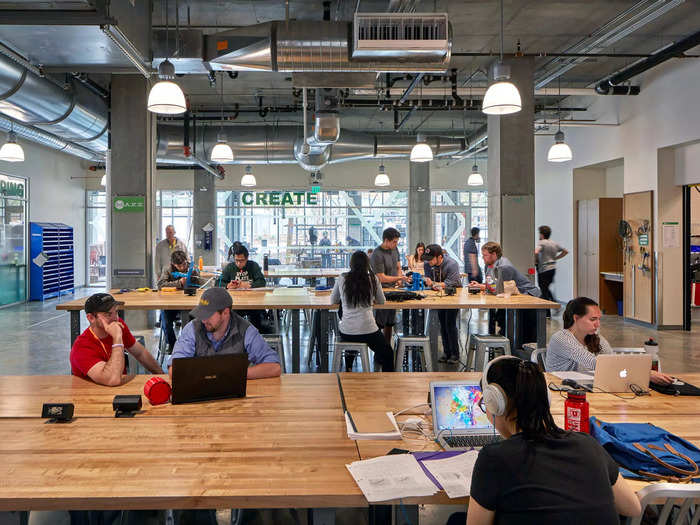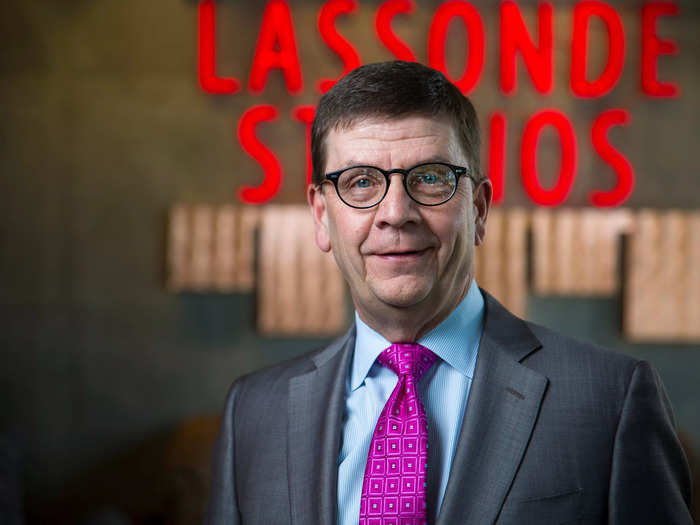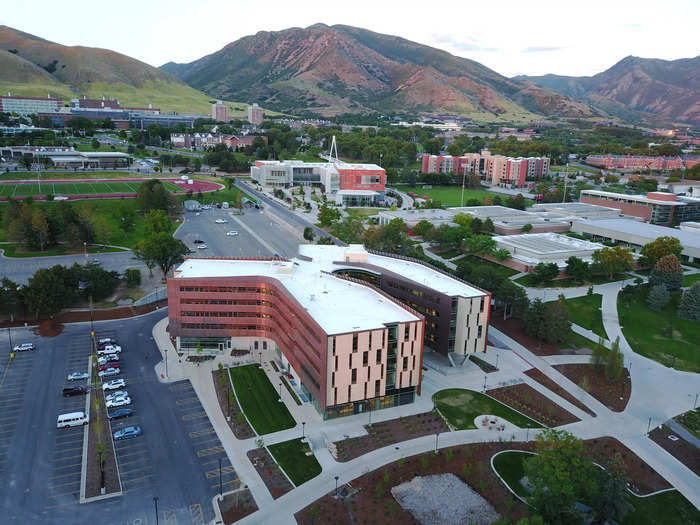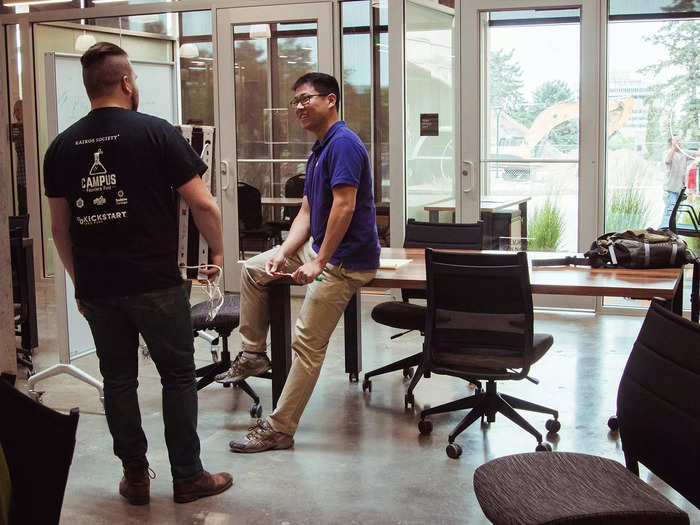Kazi Awal/Insider
- Salt Lake City is growing rapidly. Now city officials are using innovations to control the impact.
- New initiatives include creating a digital-inclusion plan and combating climate change in the state.
- The University of Utah's Lassonde Entrepreneur Institute is also working to fund local projects.
Since taking office in 2020, Salt Lake City Mayor Erin Mendenhall has debuted several initiatives, including streamlining the city's business operations, creating a digital-inclusion blueprint, and starting to tackle the effects of climate change. Her goal is to create a "culture of innovation" in the city.
"We're really leaning on the concept of change management," Nole Walkingshaw, the city's chief innovation officer, told Insider. "We're recognizing the elements that are required to change. We're clearly identifying our goals and objectives and building a plan around those."
Salt Lake City and the state of Utah have been growing rapidly. Walkingshaw said innovation is needed to balance the impact of that growth and create equal opportunities for residents. "This transformation requires us to step up our ability to serve the community. Our traditional service models need to evolve," he said.
Here's a look at the ways Salt Lake City is investing in innovation and digital transformation to meet the challenges of the future.
Streamlining the city's financial system
Salt Lake City Mayor Erin Mendenhall. George Frey/Getty Images
Last year, the mayor created the Innovation Team, composed of four people led by Walkingshaw, to modernize Salt Lake City's financial, payroll, and human-resources systems and improve transparency into how the city operates financially.
The team started by revamping the city's financial system, which had been in use since the early 1990s. Dozens of different software systems were also being used across city departments, which caused disorganization in how financial transactions were recorded. "It was a pain point," Walkingshaw said.
The Innovation Team restructured the city's chart of accounts, which is a list of accounts for recording financial transactions, and implemented the software Workday to replace multiple programs and combine everything in one place.
Upgrading the financial system will help Salt Lake City transition toward project-based accounting and budgeting, which Walkingshaw said is a priority. This approach will help city leaders better understand how much they're spending on programs, such as infrastructure or community services, and use data to allocate funding.
"I'm excited to see what the outcome will be over time," Walkingshaw said.
Collaborating on climate-change solutions
Inside the Lassonde Entrepreneur Institute. Courtesy of Lassonde Entrepreneur Institute
The Utah Climate Action Network was founded in 2016 as a partnership between the city of Salt Lake City, the University of Utah, the business community, faith organizations, and nonprofits to collaborate on mitigating the effects of climate change.
The network is facilitated by the nonprofit Utah Clean Energy, a nonprofit working to advance clean energy and climate solutions in the state. "Part of our job is to be the network leader and bring together folks who are working in climate-related disciplines," Josh Craft, the organization's government and corporate relations manager, told Insider.
The Utah Climate Action Network ensures communities like Salt Lake City coordinate with cities and towns in Utah, along with nonprofits, businesses, and universities, to achieve their climate goals. It hosts quarterly meetings for groups working on climate initiatives, like increasing electric-vehicle usage and improving air quality, to discuss ideas and find ways to join forces.
The network also holds Utah Climate Week, a series of events held annually around the state. The event brings together local governments, nonprofits, and other groups to discuss their climate projects. Climate Week is also an opportunity to connect with the public and share climate solutions, Craft said.
"We've built trust and understanding of where you can go to get answers and start to address the challenges of climate change," Craft said. "The main value is bringing people together to build expertise around this very challenging, multidecade problem."
Fostering entrepreneurship
A group of University of Utah students celebrating the 20th anniversary of the Lassonde Entrepreneur Institute. Courtesy of Lassonde Entrepreneur Institute
Salt Lake City ranks among the best cities to start a business. But that wasn't always the case. "Twenty years ago, we had a really nascent startup community in Utah," Troy D'Ambrosio, the executive director of the University of Utah's Lassonde Entrepreneur Institute, told Insider. "We had to start building the infrastructure."
The institute, which is part of the university's David Eccles School of Business, celebrated its 20th anniversary in 2021 and is ranked as one of the top 10 entrepreneurship schools in the nation by US News and World Report.
To support entrepreneurship and innovation, the institute offers programs to high-school students, undergraduates, and graduate students. Its Lassonde Studios is an on-campus residential community and innovation facility that provides resources, like laser cutters and 3D printers, to help students create and launch ideas. It also hosts the High School Utah Entrepreneur Challenge, where Utah high school students can win prize money and scholarships for their ideas.
Since its founding, the institute has helped students launch more than 2,700 startups in many different sectors, including transportation, technology, and healthcare. It's also helped startups raise more than $700 million in funding.
Expanding support for entrepreneurs outside Utah
Troy D'Ambrosio, the executive director of the University of Utah's Lassonde Entrepreneur Institute. Courtesy of Lassonde Entrepreneur Institute
The Lassonde Entrepreneur Institute is broadening its reach beyond its Salt Lake City campus. This fall, it launched Lassonde for Life, a new program for any University of Utah alumni looking to start or grow their business.
The program is free and offered online, so alumni can participate from anywhere and learn about topics such as prototyping, market research, and e-commerce. It also pairs graduates of the university who are successful entrepreneurs with alumni who want to launch a startup.
"It's a service to our alumni," D'Ambrosio said. "If at any point in your career you decide you want to explore being an entrepreneur, we can help you."
The business school is also expanding its Master of Business Creation online in January 2023. The part-time program is open to students around the world who may not be able to move to Salt Lake City, D'Ambrosio said. Curricula will focus on helping participants launch startups, access funding, and receive coaching.
Driving digital inclusion and equity
The outside of the Lassonde Entrepreneur Institute. Courtesy of Lassonde Entrepreneur Institute
One of the public-facing projects that the Innovation Team is working on is increasing digital equity and inclusion. Salt Lake City was recently named a 2022 Digital Inclusion Trailblazer by the National Digital Inclusion Alliance. Cities are judged on various criteria, including efforts to increase the affordability of home broadband services, funded digital-inclusion programming, and a digital-inclusion plan.
Walkingshaw said digital inclusion is a "passion project" for the team and is central to community resilience and modernizing the city. Salt Lake City adopted a Digital Equity Policy in 2020 to increase access to affordable broadband internet and reliable devices. The city's City Connect initiative offers public WiFi hotspots in community centers and parks, and Walkingshaw said his team is working on a laptop donation program that will provide surplus city computers to residents receiving services from the city's youth and family programs and to community partners that work with vulnerable groups.
Surveying residents about city priorities
Two people talking at the Lassonde Entrepreneur Institute. Courtesy of Lassonde Entrepreneur Institute
To learn about residents' needs and the issues they care most about, the Innovation Team conducts resident surveys every other year. The surveys ask people to share their opinions about city services, their neighborhoods, and the local job market. The next survey is in 2023.
The team plans to put more focus on residents' ideas about how to spend the city's budget, Walkingshaw said. This fall, the team will host budget panels to give residents a venue to discuss fire- and police-department funding and affordable housing, among other budget issues.






